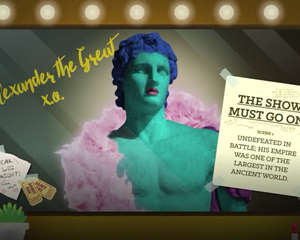Hey there. I'm Mike Rugnetta, this is Crash Course Theater, and today we're leaving Greece and moving on to Rome.
嘿,大家好,我是迈克·鲁格内塔,这里是“戏剧速成课堂”,今天我们不讲希腊了,我们来讲讲罗马。
Some of you are also hoping that we're leaving the phalli behind, but not a chance.
你们中的一些人也希望我们把“阴茎”留在后面再讲,但是,别妄想了。
Roman theatre looks a lot like Greek theater or at least the comedy does, and also some of the tragedy and the month.
罗马戏剧和希腊戏剧非常像,至少喜剧是这样,还有部分悲剧和~月份。
As for why this is the case?
为什么呢?
Part of the blame goes to Alexander the Great who disseminated the Greek theatrical tradition throughout the lands he conquered.
部分责任要归咎于亚历山大大帝,他把希腊的戏剧传统传播到了他征服的每个地方。
I guess that's what happens when Aristotle is your private tutor.
我想,如果亚里士多德是你的家教,那有可能会发生同样的事情。
This doesn't mean Rama couldn't and didn't create original entertainment like "gladiator battles" and "copulating animals" and "nude miming prostitutes" and "dwarves who chase women with clubs". And we're gonna get to all that.
这并不是说罗摩不能或者没有创造出原汁原味的娱乐方式,比如“角斗士的战斗”、“交媾的动物”、“赤裸的妓女”以及“拿着棍子追赶女人的小矮人”。这些我们都会讲到。
But first we're gonna trace the development of Roman theatre, noticing how it borrows from Greek theatre, especially late Greek comedy and then we're gonna look at how plays and production evolved from there.
但首先我们要来追溯一下罗马戏剧的发展,注意它是如何窃取希腊戏剧的,尤其是晚期希腊喜剧,之后我们会来看一下戏剧和戏剧作品在罗马是如何发展演变的。
After losing the Peloponnesian War, it's not that bad in Athens.
在伯罗奔尼撒战争(公元前431——公元前404年间,斯巴达和雅典之间爆发的战争)中战败后的雅典也没那么糟糕。
But the golden age of theater is pretty much over.
但是戏剧的黄金时代也差不多结束了。
No great tragedian like Aeschylus or Sophocles or Euripides shows up, which we know in part because festival operators made a new rule—old plays could be revived.
像埃斯库罗斯、索福克勒斯和欧里庇得斯这样伟大的悲剧作家都没有出现,部分原因是因为节日组织者制定了一条新规则,即古老的戏剧可以重新上演。
And while these are boom times for comedy the wild days of Aristophanes are definitely over.
虽然这是喜剧的繁荣时期,但阿里斯托芬疯狂的日子肯定已经结束了。
But as the theater gets less exciting, it also becomes increasingly admired and professionalized actors who used to be looked down upon get treated better and even organising to a guild.
戏剧变得没那么疯狂之后,同时也受到了越来越多的尊重,曾经被人看不起的专业演员也获得了更好的待遇,他们甚至成立了一个协会。
There are more opportunities for theater than ever before with more and more festivals and theater related to civic opportunities.
随着越来越多的节日和戏剧涉及到公民机遇,戏剧勃起的机会也比以往任何时候都要多。
But politically and socially this was a much more conservative period .
但是这段时期在政治和社会方面却非常地保守。
And that meant comedy had to change.
这就意味着喜剧必须做出改变。

The early plays of Aristophanes were extremely lewd and mentioned rulers by name.
阿里斯托芬早期的戏剧非常地肮脏下流,而且会提到统治者的名讳。
But once Athens starts tanking the war, that kind of stuff doesn't go over so well.
但是一旦雅典开始打败仗,事情就不会那么顺利了。
So Aristophanes makes his characters more general and cuts down on chorus size and spectacular effects.
因此阿里斯托芬笔下的人物变得越来越普通,缩小了合唱团的规模,场面也不像之前那么壮观。
A late-ish play like The Lysistrata doesn't mention politicians by name.
像《吕西斯特剌忒》这样的晚期戏剧是不会提到政客的名字的。
And believe it or not, the wisest rada is relatively couth.
最聪明的智者也会有愚钝的时候,信不信由你。
This possibly set the template for the genre known as Middle Comedy, which lasted from about 400 BCE to 323 BCE.
这可能为“中间喜剧”的崛起提供了参照,中间喜剧从公元前400年一直存留至公元前323年。
We don't know for sure, because no plays of middle comedy survived.
具体时间我们不确定,因为毕竟没有一部中间喜剧被保留下来。
This possibly means they weren't that funny.
这可能说明中间喜剧没有那么地有趣。
The more popular the play the more it gets copied and the better chances of its survival.
越受欢迎的戏剧就越容易被模仿,存留下来的机会也就越大。
Sort of like how Look Who's Talking Too never made it to Blu-ray.
就像《看谁又在说话》没能被蓝光收录一样。
New Comedy which is what the Romans will eventually create gets going around 323 BCE with the death of Alexander the Great.
公元前323年,随着亚历山大大帝的去世,罗马人最终研究出了“新喜剧”。
And it lasts until around 260 BCE.
新喜剧存留至公元前260年左右。
Menander is the writer that we associate with new comedy, partly because he was apparently really really great at it.
我们把米南德(雅典剧作家)和新喜剧联系到一起,部分原因是他很明显非常、非常地擅长写新喜剧。
And partly because his works survived.
还有部分原因是他有新喜剧的作品被留存下来了。
Not entirely though we do have some long fragments of four of them.
也不能说是被完全保留下来,我们只有他的四部作品残留下来的很长一段片段。
He wrote a hundred place, gaaah, papyrus. So flammable. So crumbly. So lost to history.
他写了一百张,唉,纸莎草纸,所以易燃、易碎,容易被历史掩埋。
The plays of new comedy are less absurd than those of old comedy and middle comedy and also less obscene.
新喜剧的剧情没有老喜剧和中间喜剧那么地荒谬,也没有那么地淫秽。
No padded buttocks and, get this, no phalli. I know, right, is this even comedy.
没有饱满的臀部和~又要讲到这个~阴茎。我知道,是的,虽然这是一部喜剧吧。
Gods and goddesses are mostly absent plays or about fathers and sons and mothers and virgins vain soldiers and wily slaves.
大多数的神和女神都缺席的戏剧,或者关于父亲、儿子、母亲和处女、虚荣的士兵和狡诈的奴隶。
At this point democracy had ended and it wasn't safe to criticize kings and emperors.
这个时候民主时代已经结束,所以批评国王和皇帝是危险的。
So the problems are smaller and the situations are more realistic.
所以问题更小,情况更现实。
They're so realistic that one ancient critics Edmund on displays were indistinguishable from everyday experience.
它们是如此的真实,以至于公开展出的古批评家埃德蒙和日常没什么区别。
Writing Menander or Life, which imitated which, which is impressive when you consider that men on displays were still being performed entirely by dudes wearing weird hair masks.
写下《米南德或者生活》,某某模仿的某某作品,当你想到展出的男人们仍然是完全戴着奇怪的头发面具的家伙在表演时,这会令你印象深刻。
Just as Greek comedy winds down, Roman comedy gets its start Livy.
就像希腊喜剧的没落,从李维开始出现的罗马喜剧,
An awesome historian of ancient Rome writes a hefty book between 27 and 9 BCE.
李维是一位出色的的古罗马历史学家,公元前27年至公元前9年间写下一本很大很重的书。
And according to him, Roman theater evolves in five stages: Dances to flute music, obscene improvisational verse and dances to flute music, medleys of dances to flute music, comedies with storylines and sections of lyric poetry to be sung, and comedies with storylines and song with an additional often comedic performance to be tacked on to the end.
据他所述,罗马戏剧经历了五个时期的演变:舞蹈到长笛音乐,淫秽的即兴诗歌和舞蹈到长笛音乐,混合舞蹈到长笛音乐,有故事情节的戏剧和抒情诗演唱部分,有故事情节的戏剧和歌曲——结尾通常附有额外的戏剧表演。
Dances—flute music, I mean, sure, but let's talk about this obscene improvisational verse, am I right?
舞蹈到长笛音乐,我的意思是,当然了,但是我们来讲一下这个淫秽的即兴诗歌,对吗?
Livy describes a form called the "Atellan Farce", named for the town of Atella in Campania, drawing a type of lewd mime performed by actors called "phlyakes" or "phlyakes" or maybe "phlyakes", the internet and therefore we are not sure.
李维描述了一种被称作“亚提拉闹剧”的形式,以坎帕尼亚(意大利行政区名)地区的亚提拉小镇命名,他描绘了一种哑剧,这种哑剧由被称作“phlyakes”的演员们表演,(不同的读法),网上是这么读的,我也不确定。
Until on farce involves actors improvising comedy based on stock characters like a bragging soldier, and a pompous doctor, and yes, with fake phalli, but you should really stop bringing this up because it's starting to get a little weird.
直到表演闹剧的演员根据定型的角色即兴表演的时候,比如一个爱吹牛的士兵,一个自大的医生,嗯,是的,还有假“棒子”,但是我们真的应该到此为止,因为话题开始变得有点奇怪了。
At the same time that Antolín Farce was delighting the people of Campania, there were some competing forms, like the Etruscan practice of "Versus Fescennini", which were jokey very obscene poems recited at exactly the place you would expect encounter that sort of thing—the harvest festival.
安托林闹剧让坎帕尼亚的人们欢欣鼓舞的同时,也存在一些相互竞争的形式,比如伊特鲁里亚人的“Versus Fescennini”,是一些很滑稽很淫秽的诗歌,朗诵的地方正是你想入非非的地方——丰收节。
When "Versus Fescennini" gets combined with music and dancing, it produces a form called the "Fabula Saturae".
"Versus Fescennini"和音乐、舞蹈结合的时候,演变成一种名为“Fabula Saturae”的形式。
"Fabula" means story. "Cetera" means a full dish.
“Fabula”的意思是“故事”,“Cetera”的意思是“被装满的盘子”。
And it's performed by actor, singer, dancers called "Histriones", which is where we get the english word—histrionic.
它是由演员、歌手和一种被称为“默剧表演者”的舞者一起表演的,“Histriones”也是英语单词“histrionic”的来源。
But maybe Atellan Farces were funnier, because they're the genre that survives longer.
但是,或许亚提拉闹剧的趣味性更强,因为这种类型的戏剧存留的时间更久。


